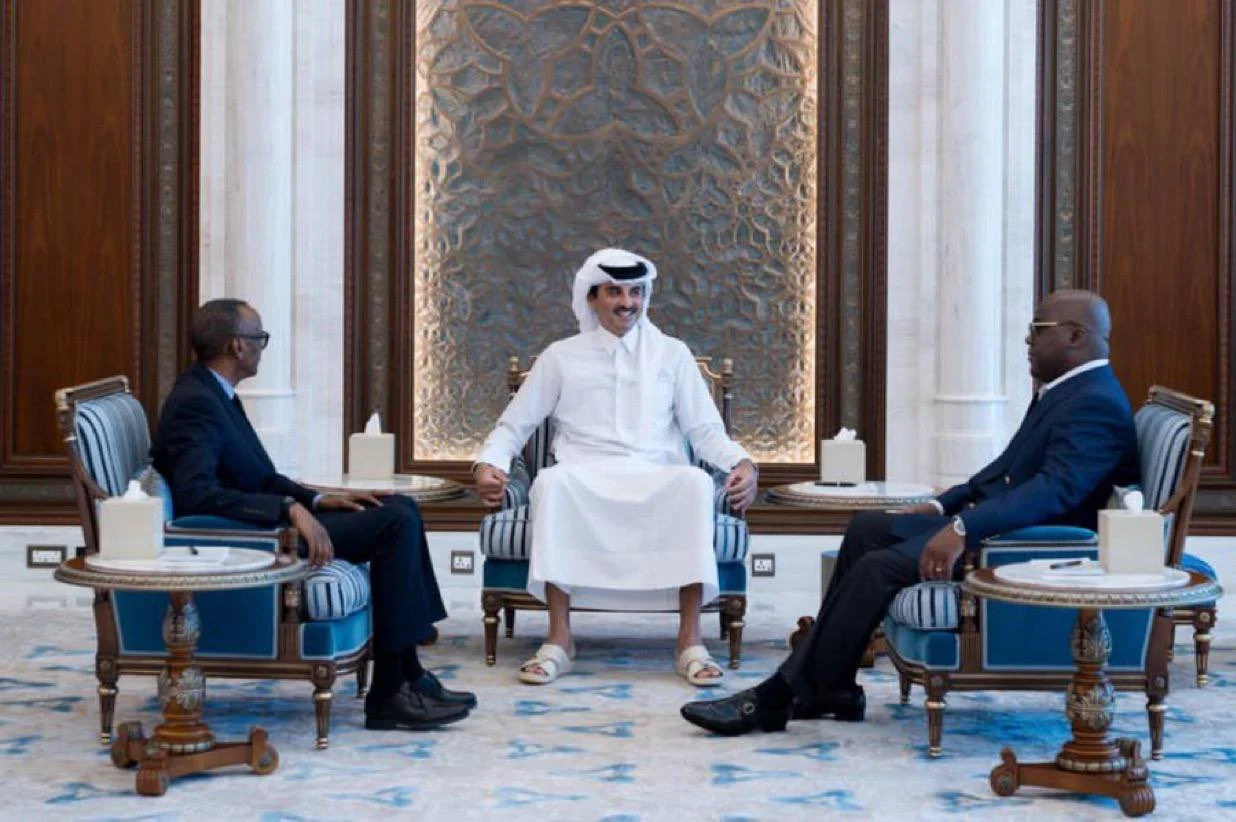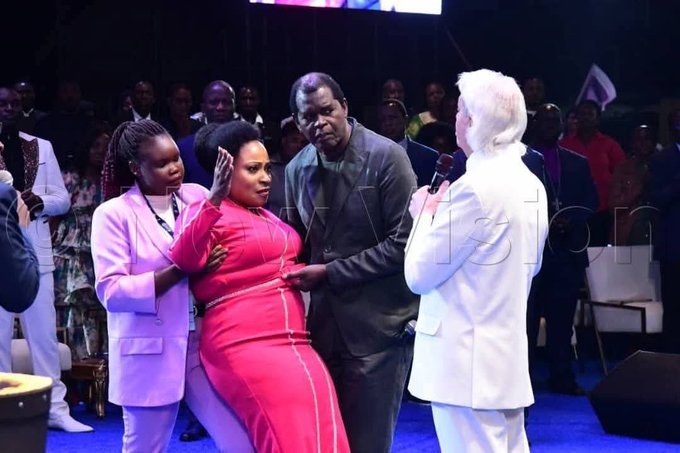News
The High Stakes Behind Kagame and Tshisekedi’s Talks in Doha

Rwandan President Paul Kagame and his Congolese counterpart Félix Tshisekedi met in Doha on Tuesday in a significant diplomatic breakthrough mediated by Qatar’s Emir Sheikh Tamim bin Hamad Al Thani.
The meeting, held at Lusail Palace, marked the first time in months that the two leaders sat across from each other, despite the worsening conflict in eastern DR Congo and growing international pressure.
For over two years, relations between Kigali and Kinshasa have been marked by open hostility, with Tshisekedi accusing Rwanda of backing the M23 rebel group, which has seized strategic towns in North Kivu province.
Kagame has denied the allegations and, in turn, pointed to the presence of the Democratic Forces for the Liberation of Rwanda (FDLR), a militia with links to the perpetrators of the 1994 Rwandan genocide, as a persistent security threat to Rwanda.
Attempts by other African leaders, including Angola’s President João Lourenço, had failed to bring the two to direct negotiations.
But Qatar succeeded where others could not, raising questions about what changed.
Kagame’s office framed the Doha meeting as a reaffirmation of support for the joint East African Community-SADC (EAC-SADC) peace process.
Rwanda also emphasized the need to address the FDLR’s presence in eastern DR Congo and ensure regional security.
Meanwhile, Qatar’s Foreign Ministry hailed the discussions as an important step toward stability in the Great Lakes region. Although no immediate resolutions were announced, the meeting reflected shifting political calculations on both sides.
The fact that Tshisekedi, who had previously likened Kagame to Adolf Hitler, agreed to the talks suggests that Kinshasa’s diplomatic posture may be evolving.
His government had largely dismissed earlier mediation efforts, opting instead for military and diplomatic isolation of Rwanda, including pushing for sanctions.
But with the situation on the ground deteriorating and M23 fighters continuing to gain territory, the Congolese leader may have found it necessary to explore other diplomatic avenues.
Rwanda, on the other hand, has faced increasing international sanctions over its alleged support for M23.
The United States, the European Union, and other Western countries have imposed restrictions on Rwandan officials, suspended military aid, and pressured Kigali to disengage from eastern DR Congo. However, these punitive measures have not altered Rwanda’s position, and M23 remains a dominant force in the conflict.
This is where Qatar’s intervention takes on added significance. Unlike Western nations, which have approached the conflict largely through the lens of punitive measures, Qatar has opted for engagement.
Its interest in mediating the crisis is not purely altruistic—it is also tied to economic stakes in both Rwanda and DR Congo.
Qatar has made substantial investments in Rwanda, including a 49% stake in RwandAir and a controlling 60% share in Bugesera Airport, which is under construction south of Kigali at a cost of at least $2 billion.
These investments make Rwanda one of Qatar’s most significant economic partners in Africa. Meanwhile, Qatar has also signaled its intent to expand its footprint in DR Congo.
After Kinshasa established an embassy in Doha, Qatar pledged to support infrastructure projects, including the renovation of N’djili and N’Dolo airports in Kinshasa and Luano Airport in Lubumbashi.
The Gulf state has also expressed interest in the construction of a deep-sea port at Banana, a venture currently led by UAE-based DP World.
With these economic interests in mind, Qatar’s diplomatic maneuvering appears to be aimed at preserving stability in a region where it is increasingly invested.
By securing a face-to-face meeting between Kagame and Tshisekedi, Qatar has positioned itself as a key broker in a crisis that has defied multiple regional and international mediation attempts.
Whether this latest diplomatic push will yield tangible progress remains to be seen. Despite the meeting in Doha, fighting in eastern DR Congo continues, and M23 has yet to commit to any major concessions.
The Congolese government still demands that Rwanda withdraw its alleged support for the rebels, while Kigali insists that the underlying causes of the conflict—including the FDLR’s presence—must be addressed.
Nonetheless, the fact that Kagame and Tshisekedi were willing to engage in dialogue after months of heightened tensions suggests that the geopolitical landscape is shifting. The failure of previous mediation efforts, the military deadlock, and the economic interests at play may have contributed to bringing the two leaders to the table.
For now, Qatar has succeeded in achieving what others could not: breaking the ice. What comes next will depend on whether the momentum from Doha can translate into lasting diplomatic engagement.

News
Benny Hinn’s Uganda Crusade Draws Over 200,000 As Claims of Miraculous Healings Emerge

Renowned televangelist Pastor Benny Hinn received a rapturous welcome in Uganda as tens of thousands flocked to witness what many have described as a spiritual awakening.
The founder of the World Healing Center Church is currently on a healing crusade in Kampala, hosted by Pastor Robert Kayanja of the Miracle Centre Cathedral.
Day one of the crusade saw an estimated crowd of over 200,000 people gathered in anticipation of divine miracles. In a message shared on his X (formerly Twitter) account, Hinn expressed joy and awe at the massive turnout and the spiritual energy of the night.
“Precious people, something extraordinary is happening in Uganda. Over 200,000 souls gathered on Night 1 of our Healing Crusade in Uganda! 60,000 lined up at 8AM for a 7PM service. 10,000 pastors stood in unity. And already, 14 nations are represented,” Hinn wrote.
The preacher went on to claim that the power of God was so strong that numerous people experienced supernatural healings. Among the alleged miracles were the disappearance of throat cancer, the restoration of blind vision, and relief from chronic pain.
“The Power of God came down like a mighty river. Throat cancer disappeared. Blind eyes were healed. Chronic pain vanished. This is the move we’ve prayed for… and it’s only just begun,” he added.
The roads leading to the crusade venue were choked with heavy traffic and large crowds on foot, many bringing along loved ones battling various illnesses. The atmosphere was charged with hope, emotion, and spiritual fervor as worshippers sang, prayed, and waited for what they believed could be their miracle moment.
One particularly emotional moment occurred when Pastor Jessica Kayanja, wife to the host pastor, reportedly fell under the “power of the Holy Spirit” after being prayed for by Hinn, prompting cheers and spiritual outpourings from the audience.
However, the crusade has not been without its critics. Some Ugandans online questioned the authenticity of the healing claims, suggesting that such miracles, if genuine, should be demonstrated in medical settings like Mulago Hospital, where countless patients suffer without such divine intervention.
Despite the doubts, the event marks one of the largest religious gatherings Uganda has seen in recent years, and many faithful remain hopeful that this crusade will continue to bring spiritual and physical transformation to those in need.
-

 News5 days ago
News5 days agoBenny Hinn’s Uganda Crusade Draws Over 200,000 As Claims of Miraculous Healings Emerge
-

 Entertainment5 days ago
Entertainment5 days agoBig Tril Weighs in on Bebe Cool’s ‘Break The Chains’ Strategy- Says it won’t sell
-

 Entertainment5 days ago
Entertainment5 days agoSembabule District Aspiring Woman MP Nina Roz Launches Scathing Attack Against Dr Stella Nyanzi
-

 Entertainment5 days ago
Entertainment5 days agoUncle Chumi Chews Her Words – Apologizes to Artin Pro
-

 Entertainment5 days ago
Entertainment5 days agoArtin Pro Breaks Silence Over Uncle Chumi’s S=xual Harassment Allegations
-

 Entertainment5 days ago
Entertainment5 days agoAlien Skin Joins Politics as DF Names Him Secretary for Arts and Culture




















